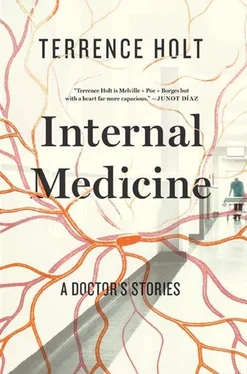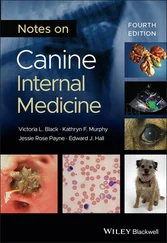“Are you in a lot of pain?”
The eyes closed. Then opened again, as she nodded. Without the lower half of her face, it was hard to read her expression.
“How much pain?”
She stared at me for a long moment before she shrugged.
The combination of her mask and her silence, the economy of her gestures, the dullness of her skin in the gray light, all made her seem more like something carved in marble than human.
“Do you think you’re swallowing the morphine?”
Another nod.
This time, I nodded back. “You’ll need a higher dose,” I said.
The eyes above the mask were looking at me. I had a brief, vivid impression that what she was really doing was measuring me for a canvas, a parrot on my shoulder.
I shook the thought away, disturbed by it more than I wanted to be, chased it away with an overly detailed explanation of how we were going to treat her pain. I moved on from there to her difficulty swallowing. I had figured out by now, looking at the profile revealed each time she inhaled (the mask fluttering in to cling against the face), that there could be no nose left under there. There seemed, in fact, to be a cavity. And then I realized where I had heard that strange pattern of lost consonants before: in children with a congenitally absent palate.
I kept trying to imagine, to construct a clear picture of what her oral cavity must be like, but I could not come up with an image, just shards of what I might glimpse if I pulled away her mask. I tried to puzzle out how the cancer could have spread from the roof of her mouth to erode the root of her tongue when a voice behind me made me start.
“She’s not eating,”
I had forgotten the husband. Charles Turner loomed out of the shadows, his voice a rumble in the dark.
“I can’t get her to take anything.” The rumble twisted slightly at the end, caught on the last syllable.
The figure on the bed lifted a hand. It hovered, palm outward, brushing gently at the air.
“Sylvie—” The voice was half a plea.
The eyes closed and then the hand made one last sweep, waving us away.
IN THE DINING ROOM, the parrots gazed down on us as we sat at the table.
Linda laid her hand on Turner’s hairy paw.
He turned toward her, reluctantly met her gaze.
“What do you think she wants now?” Linda asked.
“I think she wants — a nap.” He shook his head and blinked repeatedly.
Linda looked at him for a moment, then nodded.
“That’s right,” she said. “I think she’s tired. And when she rests, maybe you can rest, too.” With a glance at me she reached to the floor and pulled her backpack into her lap. I leaned back and let the conversation go on without me as Linda counted out on the tabletop a boxful of syringes filled with pink syrup. The parrots watched silently.
A booted foot caught my right shin. “Isn’t that right?” Linda was saying brightly, looking at me with an expression that didn’t match her voice.
“Yes,” I said automatically.
She rolled her eyes and turned back to Turner. He hunched in his seat, his large hands holding a handful of syringes like a lover’s posy.
Linda kept talking to him gently. “So we think it makes sense to treat it,” she was saying.
Turner looked up, smiled at her faintly. “Thank you,” he husked. The parrots hunched motionlessly, as if waiting for something.
Outside, the rain was coming down harder, spattering the windshield as Linda pulled the wheel around. She was looking at me instead of the road.
“What the hell got into you?”
“What are you talking about?”
“You just checked out in there.” She pulled out onto the pavement. I watched wet woods slide by and let the silence grow. I had nothing to say.
“Sometimes,” Linda said finally, “something about a case can be too much for you. It happens to everyone. It helps if you do your job anyway.”
“What are you talking about?” I said again.
“You didn’t even examine her.”
That stopped me.
She was right. I’d stood there by the bedside, taken her irrelevant pulse, and talked about drug absorption and swallowing, her fluid status, and at this point I couldn’t remember what else, but hadn’t done the simplest thing to assess the situation.
Which would have been lifting up that mask and seeing what lay beneath.
“You’re right,” I said.
Sometimes I find myself in a situation so confusing that the only thing to do is tell the truth, I think.
ONE OF THE ESSENTIAL skills in residency is a capacity to forget. There are some things you just don’t want to take home. I had no special facility at this skill, but I was usually able to set aside whatever needed setting and pick it up again the next day. The hospice rotation had been no different in this regard: whatever tragic or pathetic or sordid or horrific scenes I passed through each day faded like dreams before I reached home.
Which is why I was disturbed, that night as sleep evaded me, to find Sylvia Turner’s face looking out at me from the darkness, the eyes above the blank white mask. I had learned not to remember faces. I had learned not to be disturbed. I wasn’t bothered (I thought) that her face — the absence of it, whatever it was that white mask implied — was disturbing; I was bothered that it was still visible to me at all.
If I was frightened by its persistence, by the possibility that it was asking a question of me, I mistook my fear for annoyance. But even if I had recognized what I felt, I could not have told you what it was I feared. There was just the blank square covering — what? — and that was more than enough.
THIS VAGUE SENSE OF annoyance was gone by Monday. I dozed through morning staff meeting, through updates on who had died over the weekend, who had been doing badly, who needed to be seen today.
Linda nudged me with her elbow. Arthur, who had been on call over the weekend, was looking at us.
“What happened?” Linda had just asked, a little too brightly, overdoing it in a way that I felt dimly as a reflection on me.
Arthur’s expression went cloudy. “I’m still not exactly sure.” He riffled his notes. “The husband called, about twelve-thirty Sunday. P.m.,” he added fussily, looking over his glasses. “About some ‘church ladies’ he wanted off the premises.”
“And what did you do, Artie?” Linda asked innocently.
“About church ladies?”
Dry laughter rustled in the corner.
“I mean, were they. ” Linda paused as if searching for a word. “Causing a disturbance?” She was clearly enjoying herself. Everyone else was laughing.
Arthur was reddening. “As a matter of fact, they were,” he replied. He read without expression, “Patient’s husband reports ‘Church ladies are back again,’ and upsetting patient with unwanted religious advice. Husband wants church ladies removed and sedation for patient.”
He looked up again over a hedge of paper. In the overhead fluorescents, his glasses had taken on an opaque glare. “I offered to call the sheriff, and reminded him about the Ativan in the comfort pack. I think what he really wanted was the Ativan.”
“Don’t we all,” somebody muttered, stirring laughter again.
“THOSE CHURCH LADIES ARE going to ruin our day,” Linda growled, spinning the Honda’s front tires in the hospice lot. She pulled out onto the highway thirty yards in front of an oncoming gravel truck. I closed my eyes. “Ordinarily,” she explained, “the Turners wouldn’t be on the list again until Wednesday.” She straightened out the wheel and gunned the engine. I settled back to ignore the ride.
The day was bright, the air cool, still drenched with last week’s rain. Puddles stood in the gravel arc before the house, reflecting patches of pale sky. The reflections shivered in the breeze.
Читать дальше












